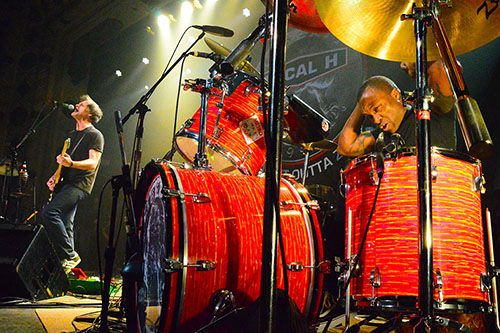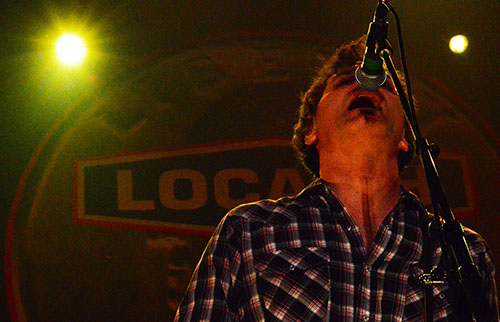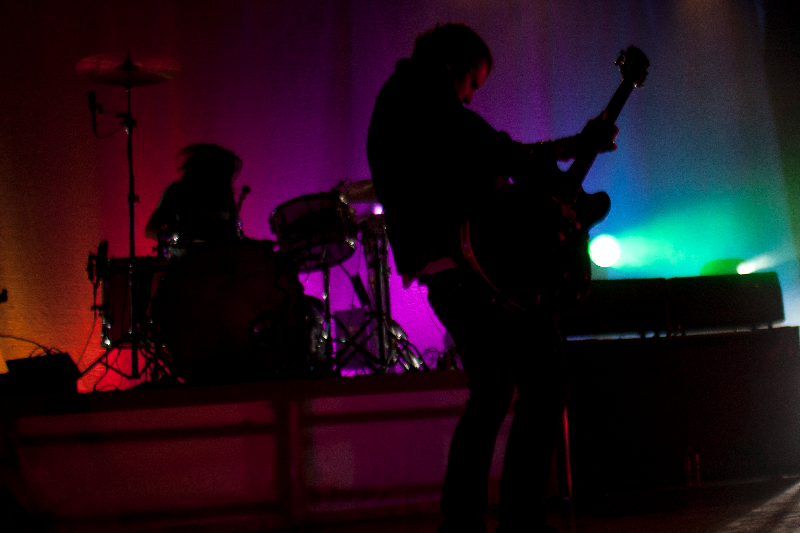

Plenty has been said about Billy Corgan. Too much, probably. The man has been and continues to be a polarizing figure in rock music, and when he’s not being judged for antics on stage or on records, he’s running his mouth and provoking critics or other bands. He also has the phrase “difficult to work with” tacked onto his resume, something he’s not apologetic about so long as his personal vision gets fulfilled. It’s why the original Smashing Pumpkins fell apart, and every project he’s done since then has failed to gain as much traction. Even when he reclaimed the Pumpkins moniker several years ago and unleashed the relatively forgettable Zeitgeist in 2007, the new people he was working with all eventually abandoned ship. That includes drummer Jimmy Chamberlain, the only original Smashing Pumpkins member left besides Corgan. You could almost audibly hear eyes rolling when the search for Chamberlain’s replacement became an online contest that ended with fresh-faced 19-year-old Mike Byrne earning a place alongside bassist Nicole Fiorentino and guitarist Jeff Schroeder as Corgan’s “hired hands.” These people are faceless entities compared to James Iha, D’Arcy Wretzky and Chamberlain. It’d be wrong to say they’re not good musicians though, and the last couple years of touring with this lineup has gone remarkably well for the Pumpkins Version 2.0.
Never one to sideline his ambitions, in 2009 Corgan announced the Smashing Pumpkins were embarking on a project he dubbed Teargarden By Kaleidyscope. The plan was to release the 44 tracks comprising this gigantic album in multiple pieces parsed out over time, all of it available for free download. The first two volumes, four tracks apiece, were released in 2010. A third volume was started, but has yet to be completed. Apparently the whole concept is undergoing a little bit of a makeover, as releasing music on a song-by-song basis wasn’t quite as successful as the band hoped it would be. Part of that makeover is the new album Oceania, marking a return to the full length format while still feeding into the conceptual Teargarden… whole. Maybe it’s the personnel shifts, maybe it’s the fact that they took the time to road test most of these new songs, or maybe it’s something else entirely, but these 13 songs are surprising because of the way they bring new life and a level of intelligence back to the Smashing Pumpkins name. For the first time in a long time, Corgan and friends have stumbled upon rock’s sweet spot.
Perhaps the biggest reason why Oceania is such a successful Smashing Pumpkins record is because of lowered expectations. On Zeitgeist, Corgan was creating the first Pumpkins record since 2000’s Machina II: The Friends and Enemies of Modern Music. His attempts to restart his career via Zwan and a solo record both fell flat, and reclaiming his old band name was a somewhat desperate attempt to remain relevant and prove his talents to a now jaded group of fans. It didn’t help matters that Zeitgeist was an overblown affair of psychedelic proportions as songs went longer and featured more solos than ever. Call it a case of trying too hard. After that point it became easy to write off the band as an act built for a certain time and place, both of which had long since passed by. Plenty of the die-hards stuck with them, and all the touring the last few years certainly didn’t leave many or any tickets left to sell at the door. Yet such devotion seems to have paid off, as time has allowed wounds to heal, people to forget and Corgan to get his memory back. The drive, wisdom and talent it took to craft amazing records like Gish, Siamese Dream and Mellon Collie and the Infinite Sadness have largely been reinstated, and the entire band plays like they’re out to prove their worth and worthiness. Only Byrne doesn’t fully succeed, simply because Chamberlain was such a powerhouse of percussion he’s irreplaceable.
Things start off strong with the acid rock riffage of “Quasar,” which bears an almost eerie resemblance to the guitar work on “Cherub Rock.” The religious affirmations he makes in the lyrics, “God right on!/Krishna right on!,” are very “Siva”-like in nature too. Such calls back to classic Pumpkins material are enough to at least inspire a little hope that maybe the band has found their mojo again. “Panopticon” holds that idea steadfast, surging ahead with confidence and intricacy before soaring into a massive chorus. “There’s a sun that shines in me,” Corgan sings at the end of the song, and for once you can almost hear him smile as he sings it. The acoustic guitars and sawing violins of “The Celestials” bring in some nice balladry reminiscent of “Disarm,” but as with almost every Corgan record, there’s a questionable lyric or two. “I’m gonna love you 101 percent,” is not one of his better moments.
What really makes Oceania tick are the transitions it goes through while you listen. It’s impeccably structured with some tracks bleeding into one another, and logical sonic progressions that never seem too far out of left field. The movement from the lighter pop-rock of “My Love Is Winter” into the synth-heavy pop of “One Diamond, One Heart” feels almost organic – their connective tissue bound by the same lyrical topic and a keyboard. Where such sonic glue is most prevalent is within the three tracks at the center of the record. The steady and beautiful “Pinwheels” flits around in its intro with some twinkling synths and cello, devolves into introspective acoustic folk then incorporates some gorgeous female backing harmonies. It feels like an appropriate slice of bread before the sandwich meat reaches your tastebuds in the form of the nine minute epic title track. Instead of simply descending into swirling psychedelic rock that was largely explored on Zeitgeist, the song instead sustains itself by continuously shifting sounds every couple minutes to keep the listener engaged. The final two minutes or so do get a little gratuitous with the guitar solos, but by that point they’re pretty much earned. The final piece of this mid-album trilogy is “Pale Horse,” a sad, pleading piano ballad that plays like a mellow version of “Thru the Eyes of Ruby.” It’s not Mellon Collie and the Infinite Sadness that best ties into these three songs though, it’s Adore. They might not have the electro-pop vibe of that record, but they do have the darkness and self-loathing in both lyrics and melody.
The crunchy heavy metal guitars on “The Chimera” suddenly whip Corgan and the rest of the Pumpkins out of their funk like somebody waking up from a nightmare or a bad drug trip. It’s an invigorating kick in the teeth worthy of future single status, as Corgan comes to the realization that, “All you need is you, lover/so please need me too.” Ignoring the romantic implications of the song and those lines, you could well interpret this as his desire to have the love and support of a larger and more avid fan base once again. While he’s maintained in interviews that such things aren’t important to him and all he wants to do is maintain his artistic integrity, the reach backwards and near copying of material from classic Smashing Pumpkins records on Oceania appears to suggest otherwise. Either that, or he’s just out of fresh ideas. Whatever the cause or reason may really be, there’s still something inherently exciting about having such a great ’90s band rediscover what made them great and prove there’s still plenty of life left in them. Then again when you’ve got a lineup of all new members, it’s not so much a rediscovery as it is just a discovery. If they can keep this going, we could well be looking at a new era of Smashing Pumpkins excellence. Let’s just hope Corgan remembers the many lessons he learned the first time around.
Buy Oceania from Amazon












